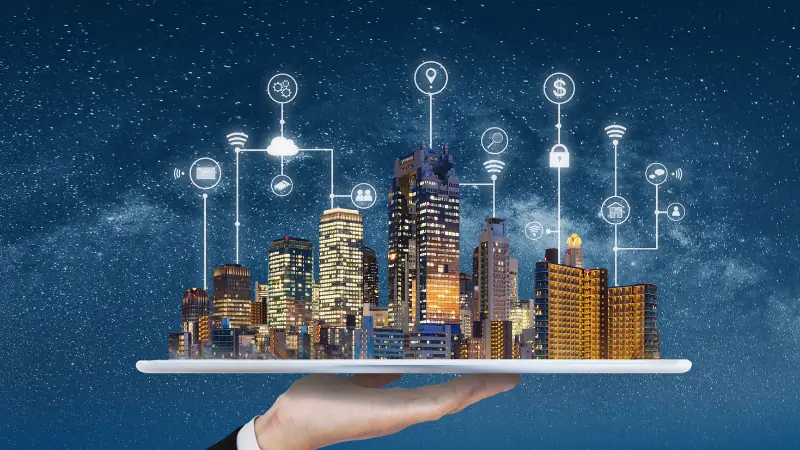
WHAT IS REAL ESTATE TECHNOLOGY?
Real estate technology encompasses a wide range of tools, from property management software to smart home devices and IoT-enabled solutions. These innovations streamline deal sourcing, transaction processing, property management, and customer interactions, enhancing efficiency across the industry.
Owners, investors, and tenants benefit in multiple ways. Virtual reality, for instance, allows prospective tenants to take remote property tours, enabling owners to reach a broader audience while filtering serious applicants. Tenants can explore multiple properties without extensive travel, simplifying the selection process.
Over the past decade, real estate technology has advanced significantly, introducing specialized solutions such as proptech innovations and cloud-based platforms. This article analyses how these developments are reshaping various aspects of the real estate sector.
PROPERTY DEVELOPMENT
Property development such as ground-up construction projects or the repositioning of buildings through value-add strategies, is one of the areas that is still ripe for transformation. Many real estate developers still use basic Excel spreadsheets to source deals, underwrite projects and track their budgets, a process that makes data prone to user error. There has not been significant standardization to date. A few early stage companies are trying to get into this space but none have caught on to the point of widespread user adoption among different stakeholders project sponsors, investors, lenders, appraisers, contractors and the like. This segment of the market is prone to disruption once property development technologies take root.

HOW REAL ESTATE TECHNOLOGY CHANGED?
As noted above property development has yet to see the same widespread disruption as other areas in the industry. There are certainly a few notable exceptions.Augmented Reality (AR) and Virtual Reality (VR) experiences are still evolving, but the simplification of the property viewing experience has made it easier for architects and engineers to model how a project might feel upon completion.
There’s also a burgeoning market for construction-related technology that leads to cost savings for real estate developers. Frankly construction has not changed much in the last millennia. The same basic techniques and materials are still widely used and building continues to be a lengthy and costly process where manual labor is still the norm.
This is one area of the property development sector that’s ripe for disruption, with trends moving toward building projects that better integrate building information modeling (BIM) a digital representation of the physical and functional characteristics of a facility. BIM is essentially a shared knowledge platform that allows for better, real-time decision-making during the lifecycle of a construction project. BIM allows team members to make various simulations (e.g., construction, design changes, power consumption) and prevents the loss of information. It can also be used upon project completion to facilitate repairs and maintenance. Using BIM software helps property developers minimize waste, control costs, coordinate workflows and optimize labor needs. Increasingly, there are developers looking to integrate BIM applications with robots and other machines that may reduce the need for costly construction materials and labor.
Tools such as these particularly once integrated with more optimal budgeting programs will be wildly beneficial for developers seeking to better track things like CapEx spend construction schedule etc. This will help to ensure all parties involved in a transaction the project sponsor, architects, designers, lenders, asset managers, and the like are marching in the same direction using the same data.
PROPERTY MANAGEMENT
Property management is one area in which technology has already had a major impact. Both hardware and software tools have revolutionized property management. Consider for example the range of hardware that can now be leveraged by property managers. Smart home devices such as Nest thermostats can be controlled remotely. This means the owner can set the temperature as appropriate when units are vacant, still allowing for utilities to be on if contractors need to be on site doing work. Smart water meters can be used to monitor leaks. For example if there’s unusual water usage coming from one unit between the hours of 1am and 5am, this is most likely indicative of a leak. The property manager is immediately notified and can investigate the problem. Hardware sensors such as these helps to drive down expenses and increase the net operating income (NOI) which ultimately increases the value of the property by several fold.
Let’s look at how new technology can be used to implement a ratio utility billback (RUBS) system. For units where the water is not individually metered, the owner gets a single bill that can then be re-allocated across the units proportionally. Property management software can calculate the cost per unit using various algorithms such as unit square footage, number of bedrooms or number of tenants living in each unit. The software program automatically factors in things like vacancy and re-calculates what’s owed per unit, and then sends tenants a bill for their resulting usage. Software programs like these not only save property managers time but also take out any potential human error.
Software programs can also be leveraged to improve tenant communication. For example some property management systems have built-in features to allow owners to send out text messages when rent payments are late or an email blast to all tenants with an important announcement, such as a planned utility shutoff needed to upgrade certain equipment. Tenants appreciate this communication (and those who want can easily opt out of automatic alerts).

SALES
Commercial real estate is a historically opaque industry. Unlike traditional free markets buyers do not in fact have access to the same information. Those who do have access to certain information have a leg up against their competition. This is where real estate technology is having a major impact. Software programs like CoStar and Reonomy, aggregate robust public and private sector data for users to mine. This makes it easier to conduct selective outreach to potential buyers and potential sellers, and to find partners or investors who may be interested in your CRE deal.
Having data alone is not enough—its true value lies in effective analysis. Sponsors must be able to interpret and leverage data to make informed decisions. Artificial Intelligence (AI) is set to play a crucial role in this space, enhancing the ability to identify trends and opportunities.
We can utilize a range of software programs, including proprietary tools, to conduct quarterly market analyses. By focusing on seven key markets, closely monitor indicators such as rapid job growth and population expansion. This data-driven approach allows us to stay ahead of the curve, identifying opportunities well before our competitors.
MARKETING
Real estate marketing has undergone a significant transformation in recent years, driven by advancements in technology. Owners and property managers now rely on high-tech software applications that streamline every aspect of operations, from marketing and leasing to property maintenance.
Some property management platforms integrate directly with digital advertising, enabling targeted promotions for apartment listings. These tools allow users to track ad views, analyze engagement, and refine outreach strategies. Additionally, the entire leasing process—from rental applications and lease signings to payment collection—can now be managed seamlessly online. While adopting these technologies requires a learning curve, they ultimately enhance efficiency and optimize marketing efforts.
There are other ways in which real estate technology has impacted apartment marketing efforts. Consider the use of smart locks for example. Advances in smart lock technology have enabled prospects to your properties on their own schedules, without having intricate coordination with a leasing broker. They can schedule an appointment to tour the property online and after filling out some basic information are then sent a code upon arrival at the property. This increases the leasing speed of vacant apartments and provides a convenience to prospects who can tour properties as early in the day or as late at night as they’d like (within reason). Tools like AR and VR, as discussed above, are also being used to market apartments to the masses.
THE INTERNET
It wasn’t all that long ago that people in search of an apartment would flip through the newspaper classified ads or scour an apartment guidebook found at the local grocery store. Today most people look for apartments from the comfort of their own home. They used sites like Google, Craigslist, Facebook, Zillow and Apartments.com to find apartments that meet their specific criteria. The model for apartment leasing has entirely changed and is perhaps the area where real estate technology has had the single greatest impact.
This evolution means that digital marketing is more important for apartment owners than ever before. Digital advertising is where companies get their biggest bang for the buck.
In fact this is true whether leasing a single unit or marketing an entire building to investors. Recent changes to SEC regulations mean that owners can bring deals to the broader marketplace with ease. We’re seeing more people utilize social media crowdfunding platforms and other digital tools to drum up interest in their deals. You no longer need to have a personal relationship with those people. Now properties can be marketed to accredited and non-accredited investors alike. Web conferencing tools like Zoom (zoom.us) are increasingly being utilized to pitch to investors without ever meeting those people face to face. This shift has been dramatic and will continue to evolve at rapid speed.
CONCLUSION
Technology is playing an increasingly significant role in commercial real estate. While the sector was slower to adopt digital solutions, it has become clear that technology is transforming how properties are acquired, managed, and sold. From deal sourcing and investor engagement to leasing and operations, advancements in software and hardware are reshaping every stage of the real estate lifecycle.
As technology continues to evolve, its full impact remains to be seen. However, those who embrace innovation will position themselves ahead of the competition, adapting more effectively to industry changes.
About the author
The author is the Managing Director at Skanda Group of Constructions. He is an experienced Civil Engineer with a demonstrated history of working in the construction industry. He is skilled in AutoCAD, Construction, Management, Concrete, and Structural Analysis.





